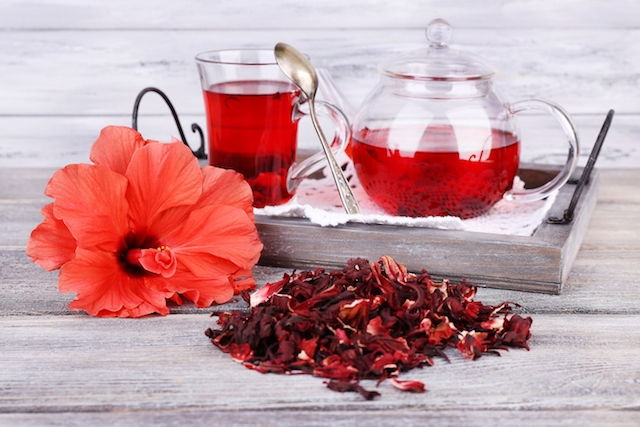Hibiscus is a medicinal plant that is rich in antocyanins, a compound that gives it its characteristic red color and provides it with a potent antioxidant effect.
In addition, hibiscus is rich in flavonoids, vitamin C and organic acids, which can all provide several health benefits, like managing blood pressure and promoting weight loss.
Hibiscus, or Hibiscus sabdariffa, can be consumed as tea, flavored water or capsules. It can easily be added to some recipes, and is available for purchase at grocery stores, natural health product stores or online.

Health benefits
Hibiscus tea has several benefits and can be used to complement treatment for many health care problems. Hibiscus tea is useful for:
1. Regulating blood pressure
Hibiscus can help to prevent and manage mild to moderate hypertension to its ability to dilate blood vessels. This effect is due to the presence of antocyanins in its composition, which has an antioxidant and diuretic affect.
Some studies show that regular consumption of hibiscus can have a similar effect to some anti-hypertensive medications, like captopril. Nonetheless, hibiscus should not substitute treatment prescribed by the doctor, as more scientific evidence is needed to support such effects.
2. Promoting heart health
In addition to decreasing blood pressure, hibiscus can also help to decrease "bad cholesterol" (LDL) and triglycerides while increasing "good cholesterol" (HDL). This action may be related to the suppression of fatty acid synthesis in the liver, which leads to fat burning in the body and decreased triglycerides in the intestines. Learn more about cholesterol levels and how they are managed.
3. Regulating blood sugar
Hibuscus is able to inhibit the activity of some pancreatic and intestinal enzymes that are responsible for the digestion of carbohydrates in the small intestine. This helps to prevent peaks in sugar levels and excessive production of insulin,
4. Promoting weight loss
Due to the presence of polyphenols (especially antocyanins), flavonoids, and other phenolic compounds like galoil, chlorogenic acid, quercetin and caffeic acid, regular intake of hibiscus can help with weight loss and prevent obesity.
It is believed that this action leads to controlled blood sugar levels, decreased absorption of carbohydrates in the intestines and better metabolism of fats. These outcomes can help to control appetite, as well as influence the hormonal functions of ghrelin and leptin, which are also related to appetite control. Read more about how hibiscus tea can influence weight loss.
5. Boosting liver function
Hibiscus may inhibit the production of fatty acids in the liver, which can lead to optimal functioning of the liver and prevent fatty liver. In addition, it may strengthen the enzymes that are responsible for detoxing, which can help to reduce liver damage.
6. Possessing antioxidant properties
Polyphenols, like antocyanins, that are found in hibiscus contain antioxidant properties that inhibit oxidative stress and prevent the formation of free radicals, which can cause cellular damage. This can help to prevent early aging and chronic illnesses like cancer.
7. Fighting bacteria
Some studies show that hibiscus possess antimicrobial properties, which can help to inhibit the activity of bacteria like Escherichia coli, Staphylococcus aureus and Pseudomonas aeruginosa.
8. Preventing UTIs
As mentioned above, hibiscus can help to fight off bacteria and inihibit their action, making it a great way to prevent and treat urinary tract infections (UTIs). It is especially effective against the bacteria that commonly cause UTIs, Escherichia coli and Klebsiella pneumoniae.
In addition, hibiscus contains diuretic properties, which help to increase urine production. Increase urine flow can help to clear out bacteria from the urinary tract and prevent infection recurrence. It is believed that the antioxidants found in hibiscus also help to regular aldosterone, a hormone that controls urine production.
Nutritional information
The following table indicates the nutritional components and values for every 100 g of hibiscus :
The health benefits mentioned above can be achieved when hibiscus is incorporated regularly into a health, balanced diet.
How to make hibiscus tea
To prepare hibiscus tea, add 1 tablespoon of dried hibiscus flowers to 400 ml of boiling water and allow it to infuse for 5 minutes. Then strain, and drink while warm at least 3 times per day. For weight loss purposes, you should drink 1 cup of hibiscus tea after your meals.
To improve blood pressure, one clinical study advised to take hibiscus tea prepared with 10 g of hibiscus in 500 ml of boiling water. The study had participants take this twice per day following meals for 4 weeks.
There are also hibiscus capsules that are available for purchase. Dosing should be recommended by a registered dietitian or a health care professional who specializes in medicinal plants. The general recommended dose is two 450 mg capsules, 3 times per day for 12 weeks, taken 20 to 30 minutes before meals.
Possible side effects and contraindications
Until now, there have been no reported side effects of hibiscus tea. It is considered to be safe for use.
Nonetheless, hibiscus tea should not be used by people who take hydrochlorothiazide, as it can interact with this mediation and decrease its effect. It should also be avoided by women who are pregnant or breastfeeding, in children under 12, and in people with a history of renal or liver disease, as there are no studies to confirm its safety in these populations.
People with a history of hypertension or diabetes that are managing their conditions with medication should consult their doctor before consuming hibiscus to prevent complications like hypotension or hypoglycemia.
Although hibiscus does not cause side effects in all people, some may experience dizziness, weakness or drowsiness due to its anti-hypertensive properties. High doses of hibiscus should not be consumed if you have a history of low blood pressure, nor should high doses be taken without medical supervision.
